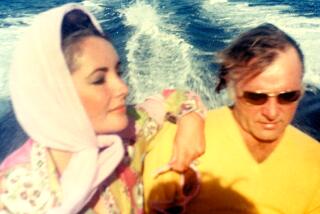A Jungle Yell Heard ‘Round the World
- Share via
No, contrary to universal popular belief, he never said: “Me Tarzan, you Jane.” In the 1932 movie “Tarzan the Ape Man,” Maureen O’Sullivan, then 21, says to Johnny Weissmuller, playing Tarzan in a film for the first time, “Thank you for protecting me.” “Me?” Tarzan asks, having never heard human language before. “No,” she says, “Me.”
He pushes her and says, “Jane.” Then he taps his own chest and says, “Tarzan.” And so they go together, into the public mind, forever, as John Taliaferro writes in this engaging new biography of Tarzan’s almost accidental creator, Edgar Rice Burroughs.
“Tarzan Forever” is a tale not only of Burroughs but of mass-marketing: Half a century before the Ninja Turtles, Burroughs created not only his Tarzan books and Tarzan movies, but also a Tarzan comic strip, Tarzan board games, Tarzan ceramic figures, archery sets, jungle maps, ice cream, puzzles and bathing suits.
The Tarzan craze continues; with the cooperation of Burroughs’ estate, Disney has released an animated “Tarzan” movie.
And Taliaferro’s book is also a perceptive and entertaining tale of Los Angeles’ early days as the capital of the young and fast-growing film industry and as a real-estate boomtown, two aspects of the metropolis that still in part define it.
*
Taliaferro, a magazine journalist who earlier wrote a well-received biography of the cowboy artist Charles M. Russell, deftly takes the reader into a world mostly gone now in this country, a world of self-made, self-taught men who lived by their wits and always hoped to strike it rich one way or another.
Burroughs did when he was 37. He sold “Tarzan of the Apes,” only the third story he submitted for publication, to the All-Story magazine, in 1912. Readers loved it and asked for more; by the end of his life, Burroughs had produced 23 Tarzan novels and 70 non-Tarzan science fiction works set on Mars, Venus and at the center of the Earth, among other places.
A conservative estimate of Burroughs’ bookselling in his lifetime, Taliaferro writes, puts that number at 30 million books; a more generous estimate is 60 million. Either way, he was, Taliaferro says, “the most widely read American author of the first half of the 20th century.”
But Burroughs was not the most admired. It hurt him, Taliaferro says, that his work was looked down on as pulp fiction, and indeed only the pulp magazines published him. He never made it into the pages of two reputable magazines of the time, the Saturday Evening Post and Colliers. It disappointed Burroughs to read that a professor of English at Iowa State College (who defined “trash” as “imagination without truth”--not a bad description of the Tarzan books) called “Tarzan of the Apes” “mere bosh.”
Taliaferro writes that Burroughs was apparently the only person in Los Angeles who didn’t make money in real estate in the 1920s. He tried hard, though. In 1917 he purchased for $125,000 Mil Flores, the 550-acre San Fernando Valley ranch and home of the late Gen. Harrison Gray Otis, the longtime publisher of The Times and founder of the Chandler family dynasty. He renamed the ranch Tarzana and founded the surrounding town of that name.
Burroughs attempted to develop both ranch and town for profit, but didn’t do well. He had a family to raise, and he had expensive tastes--many cars, and later an airplane--so in spite of all those books, he was usually short of cash and was forced to keep writing. Burroughs habitually thought he would make more money if he were in charge of the Tarzan-related projects producing income: publishing the books, making the movies, developing the country club. But he was nearly always wrong.
*
Taliaferro presents Burroughs as a man typical of men at the turn of the century: He was an extreme Social Darwinist. His bywords were “survival of the fittest,” and he was an advocate of eugenics, the improvement of human beings by careful breeding and elimination of the unfit.
Though Adolf Hitler’s monstrous demonstration of eugenics in action caused Burroughs to moderate his views, he remained a man more of Theodore Roosevelt’s time than of our own. He firmly believed in the virtues of the strenuous life, and he remained convinced that good “bloodlines” will always show in human character.
More to Read
Sign up for our Book Club newsletter
Get the latest news, events and more from the Los Angeles Times Book Club, and help us get L.A. reading and talking.
You may occasionally receive promotional content from the Los Angeles Times.










